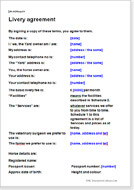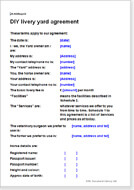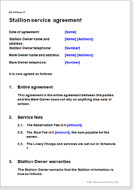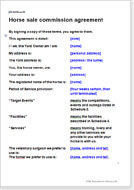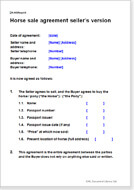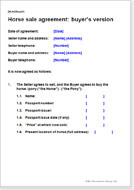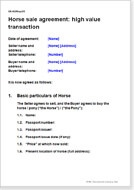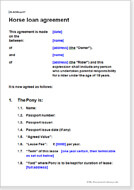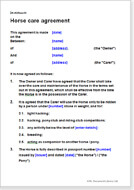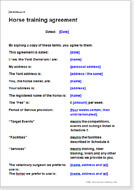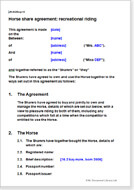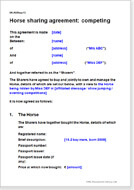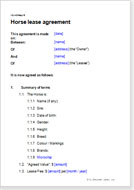These documents are written by a solicitor who has trained and bred horses for much of his life. They cover not only the standard legal matters you would expect, but also practical points that are often neglected by lawyers who do not have equestrian experience. Our use of plain English makes these templates easy to edit into an agreement that will not intimidate the other side.
Livery agreement
This comprehensive livery agreement provides everything you want in the agreement with your owners and full legal protection for you. It includes provision for details of services, prices and of course the horse or pony.
DIY livery yard agreement
This is a comprehensive livery agreement for yard owners providing "do-it-yourself " (DIY) livery services to horse owners, where the yard owner provides a loose box, and basic facilities, but the horse owner feeds, exercises and generally cares for the horse. The agreement sets out your reduced responsibility for the horse or pony while it is on your property, details and prices of services (including additional services the owner may choose to buy from you), and of course details of the horse or pony.
Stallion service agreement
This is an agreement for use primarily by any stallion owner as his standard terms, setting out clearly the mare information and warranties he needs, and terms for reservation, attendance, payment, certification, live foal guarantee. It is suitable for the owner of any pony, sport horse or special breed stallion. Although drawn primarily to protect a stallion owner, this agreement sets out matters important to the mare owner as well. It is likely to be acceptable to both parties without much editing.
Horse sale commission agreement
This is a livery agreement for situations where the yard owner acts as an agent to the sale and receives a commission if he sells the horse. In addition, he receives livery fees while the horse is on the yard.
Horse sale agreement: seller's version
This is a version of our horse sale agreement tailored for sellers rather than buyers. When buying a horse or pony, the buyer takes most risk in whether the horse is sound. A sale agreement therefore usually rebalances the risk back to the seller. This version is slightly different in that it protects the buyer slightly less and includes provisions that favour the seller rather than the buyer. If you are the seller, you are more likely to be better off presenting your own terms, rather than accepting those of the buyer.
Horse sale agreement: buyer's version
This agreement is a simple way to protect yourself as a buyer of a horse or pony. It is very hard to ascertain whether a horse has any problems or vices at a viewing, even when a vet has assessed the horse's medical condition. By using this sale agreement, you obtain the seller's promise (warranty) that there are no undisclosed problems. If there subsequently turn out to be, then it is the seller who becomes responsible for them, not you. Using this document could not only save you thousands of dollars but also much anguish over dealing with a horse that you cannot ride.
Horse sale agreement: high value transaction
This horse sale contract gives the buyer a great deal of protection if the horse is medically unsound or if the condition is not as the seller described. It is impossible to test everything that might be wrong at a viewing - your new horse might behave perfectly in the seller's arena, but might be impossible to handle at events. This agreement won't prevent those problems, but it will ensure you can seek compensation. If there is a lot at stake (financial or otherwise), a comprehensive agreement like this one is a must.
Horse loan agreement
This is a simple loan agreement to lend a horse or pony. Suitable for lending to a friend, family member or any other person. Use this document when you need to record the basic terms, but where you have high level of trust with the borrower.
Horse care agreement
This horse care agreement records how a retired or injured horse or pony will be looked after on a long term basis by someone other than the owner.
Horse training agreement
This is a comprehensive horse training agreement that includes provision for livery and the option of rider training. Although drawn for professional trainers who are likely to offer remedial training, lessons to the owner and competition experience, it could also be used by someone breaking a friend's horse as a one-off favour. Using this agreement should help prevent disputes arising as a result of mismatched or unreasonable expectations as to the service offered.
Horse share agreement: recreational riding
Many shared ownership arrangements break down because of arguments over how much each person contributes (either in money or time), who is responsible for a certain aspect of care (such as arranging for the horse to be shod) or when the horse can be ridden. Recording the arrangement in a written agreement like this one may seem overly formal, particularly between friends, but it can prevent and resolve arguments and upsets. This easy to edit horse share agreement is full of practical matters, some of which might have been overlooked without it.
Horse sharing agreement: competing
This is a shared ownership agreement for a sport horse, where one of the owners is a competition rider, and the other a financial backer. This document records the arrangement and the obligations of each owner to the other and to the care of the horse.
Horse lease agreement
This document template covers both the lease of a horse for eventing or jumping and a pony for showing. This lease is comprehensive, flexible document for both long and short term lease periods. The document is primarily protecting the interest of the owner but fairly treating the lessee.

If the document isn’t right for your circumstances for any reason, just tell us and we’ll refund you in full immediately.

We avoid legal terminology unless necessary. Plain English makes our documents easy to understand, easy to edit and more likely to be accepted.

You don’t need legal knowledge to use our documents. We explain what to edit and how in the guidance notes included at the end of the document.

Email us with questions about editing your document. Use our Lawyer Assist service if you’d like our legal team to check your document will do as you intend.

Our documents comply with the latest relevant law. Our lawyers regularly review how new law affects each document in our library.
Documents that cover a wide range of equestrian arrangements
Equestrian legal documents are one of our specialties. The writer of these documents has ridden for many years and has bought and sold many equines for recreational use, to back and sell on, and for the family-run stud. The document is carefully considered to include practical matters as well as legal issues.
The documents, although varied, contain common elements, such as standards of care and disclosure of vices.
Why you should use an agreement to record your arrangement
Using a legal agreement might seem overly formal when you are dealing with someone who is also passionate about equestrianism, and perhaps who is a friend.
But just as in any business arrangement, an informal agreement can lead to numerous problems later. Without having the deal in writing, there may be confusion as to who agreed to pay vet bills, what level of service was agreed, or even to whom the equine actually belongs. Arguments can be time consuming, expensive and can cause worry. They can also end friendships.
If you use one of these agreements, the terms are clear and agreed, so there is far less likely to be any misunderstanding. The risk of conflict is also drastically reduced because each side knows what he or she has committed to and that a court claim will follow if he or she ignores that.
A good, readable contract provides a marker to your efficiency just as much as a tidy yard and happy animals.
Use of plain English will remove any worry from your clients that they need are signing a document that they need a solicitor to check before signing.
Whatever agreement you choose, remember that there is a strong psychological advantage in you being the party who presents the first draft document to sign or for discussion. You have the opportunity to frame the deal in your terms. This applies of course to any situation where a legal document is required.
Matters related to care of your horse
You may take it for granted that arrangements for care and management are covered very thoroughly. Each agreement contains different arrangements according to what is reasonably required. Here are some examples:
- feed and exercise
- use of third-party professionals such as a vet or farrier
- who pays for damage caused by a horse?
- insurance: what is covered and who pays
- obligations of the owner
- safety on and off the yard
Livery agreements
You can use our livery agreements to explain how the stable works and to set down your practical rules and expectations. Yard procedures are given at the end of the document, and you can edit these to your exact requirement.
You can use one of these agreements as a hand-out for each client to sign and exchange parts with you or you can present a client with a draft and agree to negotiate each as a special deal.
It is not enough to post a copy on the wall of your tack room. That is useful as a reminder but it will not be binding. You need a signature.
These agreements are drawn primarily to protect the stable owner but the tone and content are intended to avoid offence by a client. However, as you read it, you may decide to soften some of the strictest suggestions we have made. You can easily change anything that does not suit exactly what you want.
Training
Many horsemen simply agree to a training deal casually under the assumption that the owner will turn up from time to time for lessons on her ever-improving horse. It is easily done. But that leaves you open to numerous potential problems. Without the terms of training written down, it is likely that at some point you will disagree with your client about exactly what they should reasonably expect from you.
For example, you will want to know about:
- the present stage of the education of the horse or pony
- whether the real purpose re-training
- if it is for backing, how far will the process be taken
- whether the work be driven by a target outcome, or simple by a number of weeks
- whether the work includes rider training as well
We suggest you write the precise terms into a schedule to the agreement.
Sharing arrangements
Before you sign up to a sharing agreement, it is important to sit down and talk over each item. These agreements are not drawn to favour one side over the other. There will be small practical points you will decide to add, for example, one person might not want to deal with a farrier, or it may be important that one of you has access on Wednesday afternoons for a riding club attendance.
Consider the areas where something may go wrong with the proposal or your relationship and ask “What would we do if . . .” Those issues must be covered in the way you want.
Sharing ownership of a sport horse has advantages for both the rider a backer. It can give a rider a financial or motivational incentive to perform, and it can reduce the upkeep costs and the responsibility of the backer.
The aim of our sharing agreement for a competing horse or pony is to set out not only a record of ownership, but of agreed responsibility: for management, care and competitions. With it, backers will find that they aren't just a never-ending source of finance.
Matters relating to sale
When buying a horse or pony, the old phrase "buyer beware" applies. Unlike many other transactions, you have no statutory legal protection (unless you buy from a dealer). A horse may seem sound when you view it, only to show problems shortly after you take it home.
After all, it is only natural to want to show an equine in a good condition or talk up its achievements, both to maximise the price and to increase the chance of a sale. The seller may not intentionally be trying to dupe you, but it is all too easy to include bute in feed the day before you view it or say that the equine is a good competition jumper when in fact it has only jumped in the neighbour's arena. In short, few equines are perfect and there are ways of hiding problems that a seller won't be inclined to tell you about.
A vet's report will give you some assurance that the equine is medically sound, but you shouldn't rely on a report alone. Vets can make mistakes, particularly since they are only looking at the equine at a point in time, and are unlikely to know about historical injuries. Of course, a vet cannot tell you anything about the horse's temperament, ability or suitability for you.
Using warranties
No agreement can mend a broken horse. But both parties to a contract can benefit from warranties by the other of them. A warranty is a promise about some fact or state or future action. If it turns out that a warranty was untrue, the agreement is breached and one party can claim from the other.
If you are the seller then you may prefer to use an agreement drawn primarily to protect you. The Net Lawman version here still protects both parties, but prefers your interest. Presenting your agreement allows you to set the terms and warranties.
- confirmation that the matters I had thought of and addressed were satisfactory
- several additional matters from the template that I hadn't considered
- confirmation that the tone of my document was appropriate
- simplified my language further
- correct definitions of terms
It gave me great confidence that my document would serve the purpose I intended, would manage the risks and would 'stand up' if things went pear shaped.
All rights reserved

